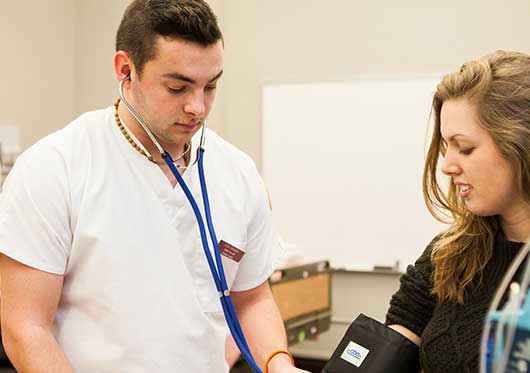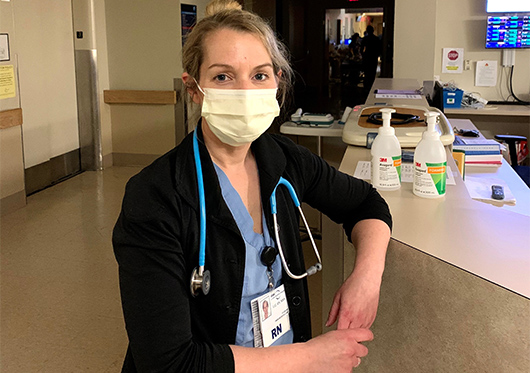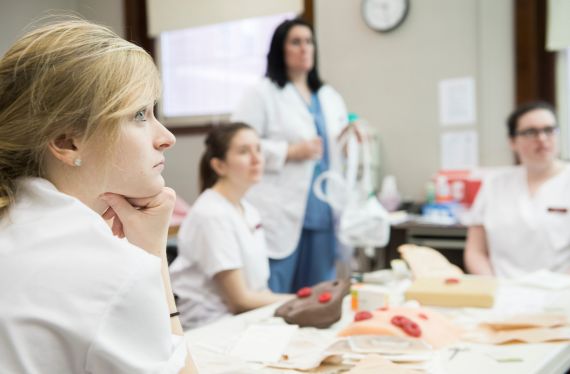It’s not uncommon to explore a career change at some point in your professional life. Many people complete a degree in a particular field and spend several years working before realizing that there’s something missing—that they need to make a change.
For those who find themselves in this position, many look to nursing to find a rewarding career that fits their needs and allows them an opportunity to make a difference. Although taking the leap can seem intimidating, be assured that it is certainly achievable and it’s never too late to pursue your passion.
Below we take a look at the reasons that some choose to pursue nursing as a second career, as well as the process of making a career change to nursing.
Nursing as a Second Career
“Over the last 10-15 years, there’s been a surge in individuals who had originally selected a different occupation, received a bachelor’s degree, and now come into nursing,” says Dr. Donna Glynn, associate dean of nursing at Regis College. “The reasons for this surge vary.”
One of the main reasons people choose to pursue nursing as a second career is the promising job market. “The nursing shortage is here, and the job market is huge,” Glynn says.
According to the Bureau of Labor Statistics, the demand for registered nurses is expected to grow 12 percent from 2018 to 2028, resulting in an estimated 371,500 new jobs. Additionally, those looking to enter the field of nursing can typically expect generous compensation. In 2018, registered nurses made an average salary of $71,730 per year, or $34.48 per hour.
Another factor that makes nursing appealing is the flexibility and variety that it offers.
“Nurses can work in a variety of settings—acute care, home care, education, community health—and a variety of hours,” Glynn says. “Healthcare is 24 hours a day, seven days a week. Nurses can work flexible hours to make it work for their families.”
But perhaps most of all, people tend to be drawn to nursing out of a desire to make a difference in the lives of others.
“We’re also seeing many people who are coming into nursing, even with the current coronavirus pandemic, out of a need to have a more fulfilling career,” Glynn says. “They want to feel like they’re helping others, and nursing offers them that path.”
Steps for Starting a Second Career in Nursing
No matter what your motivations are, nursing is a highly rewarding career and it is never too late to pursue your passions. Here’s a closer look at the process of making a career change to nursing and three tips for success along the way.
1. Complete the prerequisites.
People can enter the field of nursing with all kinds of backgrounds, including anything from art history to English and a wide variety of other degrees. Since the fundamentals of nursing are rooted in the sciences, though, people tend to have an easier transition when they have a science-related background.
If you do have a science background, such as a previous degree in biology, chemistry, or physiology, then you’ve likely already completed the prerequisites needed for nursing school. If you don’t have this background, don’t worry.
“If an individual does not have a science background, there is a series of prerequisite courses that they have to complete before applying to a nursing program,” says Glynn.
2. Enroll in an accredited nursing program.
While you may be able to become an RN with an associate’s degree in nursing, career changers often choose to pursue a bachelor’s degree in nursing, as it is typically the preferred or required education for employment in the field. Many accelerated programs are also specifically designed for non-nurse graduates, and are tailored to fit the needs of second career nurses.
“Many colleges, including Regis, have programs for individuals who have already completed a bachelor’s degree in another field,” Glynn says. “These are accelerated bachelor’s programs. Right now at Regis, someone with a previous bachelor’s degree in a non-nurse major, who meets all of the prerequisites, can complete their bachelor’s in nursing in 16 months.”
Depending on your specific goals and needs, there are other program options available as well. For example, Regis also offers a 24-month program for non-nurse graduates, which can allow for additional flexibility for those who prefer to work while earning their degree.
3. Complete clinical requirements.
As part of your education, you will also need to complete a number of clinical hours in order to develop the practical skills that you’ll need in the field. These clinical hours usually take place in a hospital or clinic setting provide students the opportunity to build hands-on experience.
“There’s a significant amount of direct patient care as a student nurse,” Glynn says. “At Regis we utilize all of the Boston hospitals—like Brigham and Women’s, Massachusetts General, Beth Israel Deaconess, and Boston Children’s Hospital—and the community hospitals—like Newton Wellesley and Lahey— to provide our students with that rich environment.”
4. Pass the NCLEX exam.
The next step toward becoming a registered nurse is to sit for and pass the National Council Licensure Examination for Registered Nurses (NCLEX-RN). This is a national examination which tests your practical skills and knowledge of critical nursing content areas. You must pass the NCLEX-RN to be eligible for licensure.
5. Obtain licensure.
Finally, after completing an accredited nursing program, fulfilling your clinical requirements, and passing the NCLEX-RN, you can apply for licensure to practice.
The specific requirements for licensure may vary by state. For example, to become a nurse in Massachusetts, you must have a license specific to Massachusetts in order to practice in the state.
Tips for Making a Career Change to Nursing
Glynn shared three important tips for those pursuing a second career in nursing: Be prepared, build a support system, and look for ways to gain experience.
1. Be prepared.
The path to becoming an RN is rigorous, but attainable and highly fulfilling. Glynn urges students to be prepared for everything this journey has in store by understanding the curriculum and requirements of the program you ultimately decide to enroll in.
Remember that you can always reach out to an admission counselor or program advisor when you have questions or concerns. Throughout the program, work together with your advisor and other faculty to create a schedule that fits your needs and keep you on track to success.
2. Have a strong support system.
Although 16 or 24 months may seem like a long time, graduates are often surprised at how quickly the time seems to go by. Because there is so much to learn during this period, it’s important that students have a strong support system in place when they enroll in an accelerated nursing program.
Make sure you have a strong support system around you that can help you manage the balance between school work and life’s obligations. At times, taking the steps to pursue a second career in nursing may be challenging, but with the right people supporting you, you will be able to succeed.
3. Take advantage of opportunities to gain experience.
Glynn’s final piece of advice is to take advantage of opportunities to build practical experience in the field. For instance, after completing their first clinical course, students can work as nursing assistants, which is a great way to build their skills and experience. This is also a great way to get your foot in the door for future employment.
Additionally, consider the ways your experience from your previous career can be applied to nursing.
For example, Elizabeth Landers, a former teacher and graduate of Regis’ accelerated BSN program found an intersection between her previous career in education and her new passion, for nursing. “What I didn’t anticipate was how closely nursing and education would align, and I found myself spending more and more time on patient education,” Landers says. “As soon as I started practicing nursing at the bedside, I realized how much of what nurses do is education.”
Since becoming a nurse, Landers has further explored this intersection and has pursued a successful career in nursing education. Landers now serves as an Associate Professor of Nursing and the Director of the Accelerated BSN in Nursing Programs at Regis College.
It’s Never Too Late To Pursue Nursing
No matter what made you decide to make a career change, it’s never too late to pursue a promising and rewarding career in nursing. With a strong support system, preparation, and determination, you can make your dream career a reality.







